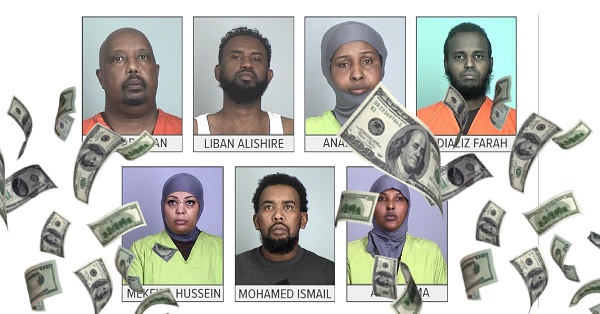Business
Fed executive pay rises $571 million since 2015

From the Canadian Taxpayers Federation
Author: Ryan Thorpe
Executive compensation in the federal government spiked by more than half-a-billion dollars since 2015, according to access-to-information records obtained by the Canadian Taxpayers Federation.
From 2015 to 2022, executive compensation across federal departments and agencies rose from $1.38 billion to $1.95 billion – an increase of 41 per cent. Meanwhile, the number of federal executives grew from 7,138 to 9,371 – an increase of 31 per cent.
Inflation increased by 19.4 per cent between 2015 and 2022, according to Statistics Canada data.
The average annual compensation among federal executives also rose from $193,600 to $208,480 during that period.
“Taxpayers need help with the rising cost of living, not higher taxes to pay for more highly paid paper-pushers,” said Franco Terrazzano, CTF Federal Director. “It’s a safe bet that most Canadians struggling with grocery bills, heating bills and mortgage payments aren’t losing sleep worrying that government executives aren’t paid enough, so why is the government ballooning its c-suite?”
Table: Federal executive compensation, 2015 to 2022
|
Year (as of March) |
Number of executives |
Executive compensation |
|
2015 |
7,138 |
$1,381,987,936 |
|
2016 |
7,181 |
$1,406,613,900 |
|
2017 |
7,209 |
$1,410,973,156 |
|
2018 |
7,438 |
$1,460,468,760 |
|
2019 |
7,863 |
$1,555,972,489 |
|
2020 |
8,202 |
$1,692,682,269 |
|
2021 |
8,837 |
$1,836,893,134 |
|
2022 |
9,371 |
$1,953,667,640 |
The spike in federal c-suite pay follows years of underwhelming performance results across departments and agencies.
In 2022-23, federal departments hit just 50 per cent of their performance targets, according to data from the Treasury Board of Canada Secretariat. Each year from 2018 through 2021, federal departments met less than half of their performance targets.
“Less than 50 per cent of performance targets are consistently met within the same year,” according to a 2023 report from the Parliamentary Budget Officer, the government’s independent budget watchdog.
About 90 per cent of federal executives get a bonus each year, according to records obtained by the CTF. The feds handed out $202 million in bonuses in 2022, with the average bonus among executives being $18,252.
The feds handed out $1.3 billion in bonuses since 2015. The annual cost to taxpayers for federal bonuses has risen by 46 per cent during that time.
The number of employees receiving a six-figure annual salary has more than doubled under Prime Minister Justin Trudeau.
A total of 102,761 federal bureaucrats received a six-figure salary in 2022, according to access-to-information records obtained by the CTF. When Trudeau came to power in 2015, 43,424 federal bureaucrats were collecting a six-figure salary.
The feds also handed out more than 800,000 raises between 2020 and 2022. With the feds employing about 400,000 bureaucrats, that means multiple employees received more than one raise in recent years.
Under the Trudeau government, the size of the federal bureaucracy has spiked by about 40 per cent, with more than 98,000 new hires.
“In the last couple years, taxpayers have paid for tens of thousands of new bureaucrats, hundreds of thousands of pay raises and hundreds of millions in bonuses, and we’re still getting poor performance from the bureaucracy,” Terrazzano said. “Trudeau needs to take air out of the ballooning bureaucracy, and he should start by reining in the c-suite.”
Business
Largest fraud in US history? Independent Journalist visits numerous daycare centres with no children, revealing massive scam

A young journalist has uncovered perhaps the largest fraud scheme in US history.
He certainly isn’t a polished reporter with many years of experience, but 23 year old independent journalist Nick Shirley seems to be getting the job done. Shirley has released an incredible video which appears to outline fraud after fraud after fraud in what appears to be a massive taxpayer funded scheme involving up to $9 Billion Dollars.
In one day of traveling around Minneapolis-St. Paul, Shirley appears to uncover over $100 million in fraudulent operations.
🚨 Here is the full 42 minutes of my crew and I exposing Minnesota fraud, this might be my most important work yet. We uncovered over $110,000,000 in ONE day. Like it and share it around like wildfire! Its time to hold these corrupt politicians and fraudsters accountable
We ALL… pic.twitter.com/E3Penx2o7a
— Nick shirley (@nickshirleyy) December 26, 2025
Business
“Magnitude cannot be overstated”: Minnesota aid scam may reach $9 billion

Federal prosecutors say Minnesota’s exploding social-services fraud scandal may now rival nearly the entire economy of Somalia, with as much as $9 billion allegedly stolen from taxpayer-funded programs in what authorities describe as industrial-scale abuse that unfolded largely under the watch of Democrat Gov. Tim Walz. The staggering new estimate is almost nine times higher than the roughly $1 billion figure previously suspected and amounts to about half of the $18 billion in federal funds routed through Minnesota-run social-services programs since 2018, according to prosecutors. “The magnitude cannot be overstated,” First Assistant U.S. Attorney Joe Thompson said Thursday, stressing that investigators are still uncovering massive schemes. “This is not a handful of bad actors. It’s staggering, industrial-scale fraud. Every day we look under a rock and find another $50 million fraud operation.”
Authorities say the alleged theft went far beyond routine overbilling. Dozens of defendants — the vast majority tied to Minnesota’s Somali community — are accused of creating sham businesses and nonprofits that claimed to provide housing assistance, food aid, or health-care services that never existed, then billing state programs backed by federal dollars. Thompson said the opportunity became so lucrative it attracted what he called “fraud tourism,” with out-of-state operators traveling to Minnesota to cash in. Charges announced Thursday against six more people bring the total number of defendants to 92.
BREAKING: First Assistant U.S. Attorney Joe Thompson revealed that 14 state Medicaid programs have cost Minnesota $18 billion since 2018, including more than $3.5 billion in 2024 alone.
Thompson stated, "Now, I'm sure everyone is wondering how much of this $18 billion was… pic.twitter.com/hCNDBuCTYH
— FOX 9 (@FOX9) December 18, 2025
Among the newly charged are Anthony Waddell Jefferson, 37, and Lester Brown, 53, who prosecutors say traveled from Philadelphia to Minnesota after spotting what they believed was easy money in the state’s housing assistance system. The pair allegedly embedded themselves in shelters and affordable-housing networks to pose as legitimate providers, then recruited relatives and associates to fabricate client notes. Prosecutors say they submitted about $3.5 million in false claims to the state’s Housing Stability Services Program for roughly 230 supposed clients.
Other cases show how deeply the alleged fraud penetrated Minnesota’s health-care programs. Abdinajib Hassan Yussuf, 27, is accused of setting up a bogus autism therapy nonprofit that paid parents to enroll children regardless of diagnosis, then billed the state for services never delivered, netting roughly $6 million. Another defendant, Asha Farhan Hassan, 28, allegedly participated in a separate autism scheme that generated $14 million in fraudulent reimbursements, while also pocketing nearly $500,000 through the notorious Feeding Our Future food-aid scandal. “Roughly two dozen Feeding Our Future defendants were getting money from autism clinics,” Thompson said. “That’s how we learned about the autism fraud.”
The broader scandal began to unravel in 2022 when Feeding Our Future collapsed under federal investigation, but prosecutors say only in recent months has the true scope of the alleged theft come into focus. Investigators allege large sums were wired overseas or spent on luxury vehicles and other high-end purchases. The revelations have fueled political fallout in Minnesota and prompted renewed federal scrutiny of immigration-linked fraud as well as criticism of state oversight failures. Walz, who is seeking re-election in 2026 after serving as Kamala Harris’ running mate in 2024, defended his administration Thursday, saying, “We will not tolerate fraud, and we will continue to work with federal partners to ensure fraud is stopped and fraudsters are caught.” Prosecutors, however, made clear the investigation is far from finished — and warned the final tally could climb even higher.
-

 International16 hours ago
International16 hours agoOttawa is still dodging the China interference threat
-

 Business14 hours ago
Business14 hours agoThere’s No Bias at CBC News, You Say? Well, OK…
-

 Automotive13 hours ago
Automotive13 hours agoCanada’s EV gamble is starting to backfire
-

 International15 hours ago
International15 hours ago2025: The Year The Narrative Changed
-

 Fraser Institute1 day ago
Fraser Institute1 day agoCarney government sowing seeds for corruption in Ottawa
-

 Daily Caller1 day ago
Daily Caller1 day agoWhile Western Nations Cling to Energy Transition, Pragmatic Nations Produce Energy and Wealth
-

 Business1 day ago
Business1 day agoResidents in economically free states reap the rewards
-

 Alberta1 day ago
Alberta1 day agoAlberta Next Panel calls for less Ottawa—and it could pay off






